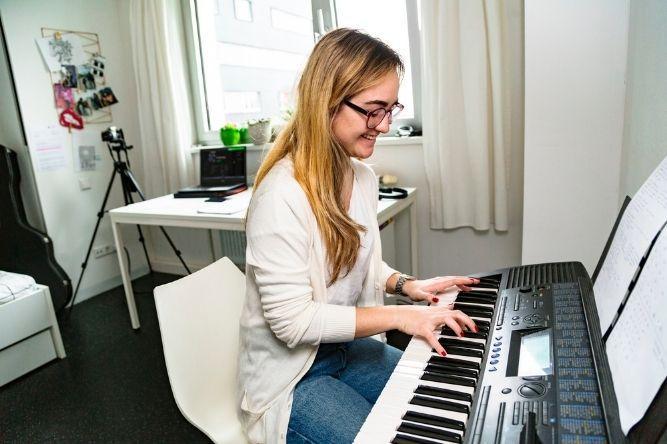The piano is one of the most universally iconic and enjoyable instruments, appearing in countless forms of entertainment. It is no surprise that it is a go-to instrument for many who wish to master music. However, learning piano requires a great deal of concentration, time, and practice, which is why so many individuals do not go through with completing their piano journey.
To stay focused in an age where your concentration can be broken by so many distractions is no easy feat. Piano practice has to be met with dedication, and that can often be thwarted with temptations from our devices or hanging out with friends, etc. Despite how much you may love the piano, it may always seem like something is pulling you away. Here are some helpful tips to assist you with practicing:
Tips
Create Goals
Taking on the piano can be intimidating at first. Creating goals for yourself in a journal or agenda can help you maintain concentration and organize how you go about practicing, ridding you of any unmotivated feelings. You can even be competitive with yourself, which will result in you putting in more effort and having fun.
Take a Break
Practicing for a lengthy period can be exhaustive and could indirectly halt your progress. Feel free to take breaks when appropriate or set an alarm for five or ten-minute breaks, but use that time wisely. Get a drink, a snack, walk around or give yourself a rest to improve those energy levels. Pianist Magazine highly recommends taking a moment, as it can increase your learning retention and effectively keeps you focused. Use your break effectively and wisely to avoid any distractions.
Designated Time
Choosing one designated time each day can help in creating an organized schedule. You will not be as tempted to make plans when you know you have a piano practice session. Pick a time of day that works for you. Other pianists may have an ideal time to practice piano, like in the morning or the evening. Choosing a time can be beneficial in the piano learning process.
Warm-Up
The idea of a warm-up before practice may seem time-consuming. Warming up is wise for many reasons, from preventing carpal tunnel or tendonitis to simply improving your flow when playing. You will spend less time being rusty during practice which is always a bonus for developing playing skills.
Slow Down
Putting pressure on yourself to learn specific songs that require a lot of work might not be good for you. Learn them at half speed and when you feel comfortable, play faster. Use a metronome and pay attention to the speed and listen to the notes; you will notice a difference in your piano performance.
Enjoy the Music
As a pianist, you want to enjoy the music you play. If you are playing music that you don’t like while you practice, you’ll find yourself unable to concentrate and may begin to feel unmotivated. Choosing tunes you enjoy will boost your interest and help you stay interested.
Be Positive
Making mistakes and having trouble learning the piano is perfectly okay, as it is a part of the journey. Most musicians and composers found difficulty mastering their instruments, whether piano, guitar, or saxophone. Make sure to keep playing and continue your practices, as you will find that it will only be a matter of time before you start to sound like a focused and professional pianist.
Signing up for piano lessons can help further your training and strengthen your musical understanding. With classes and practice, you’ll definitely hear significant improvements.



